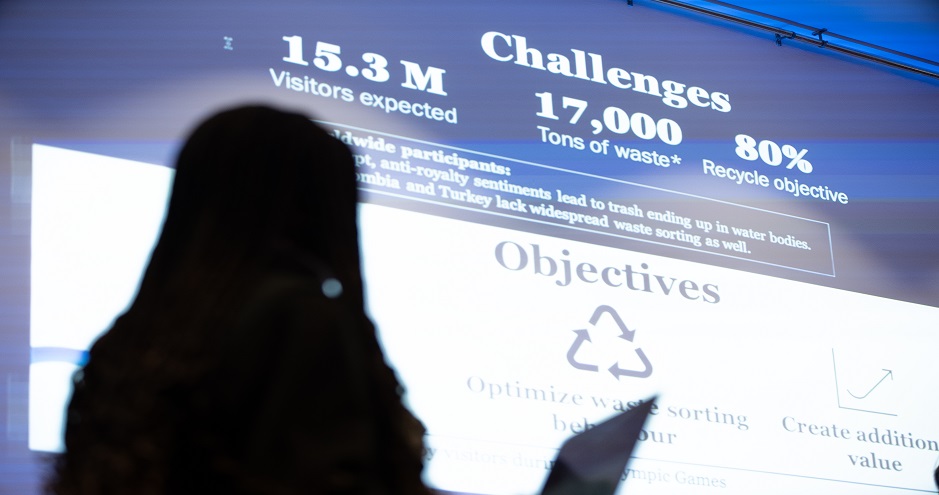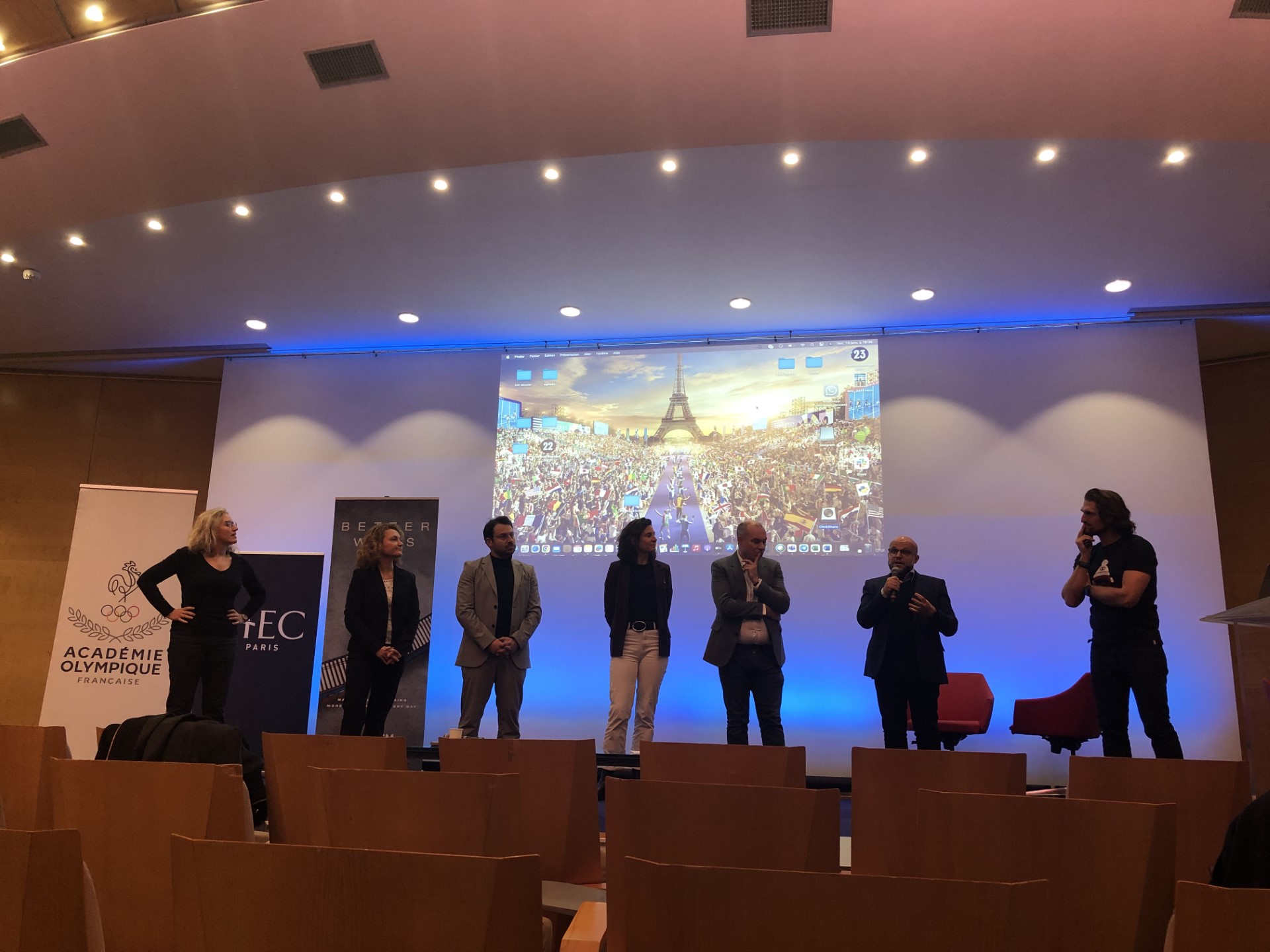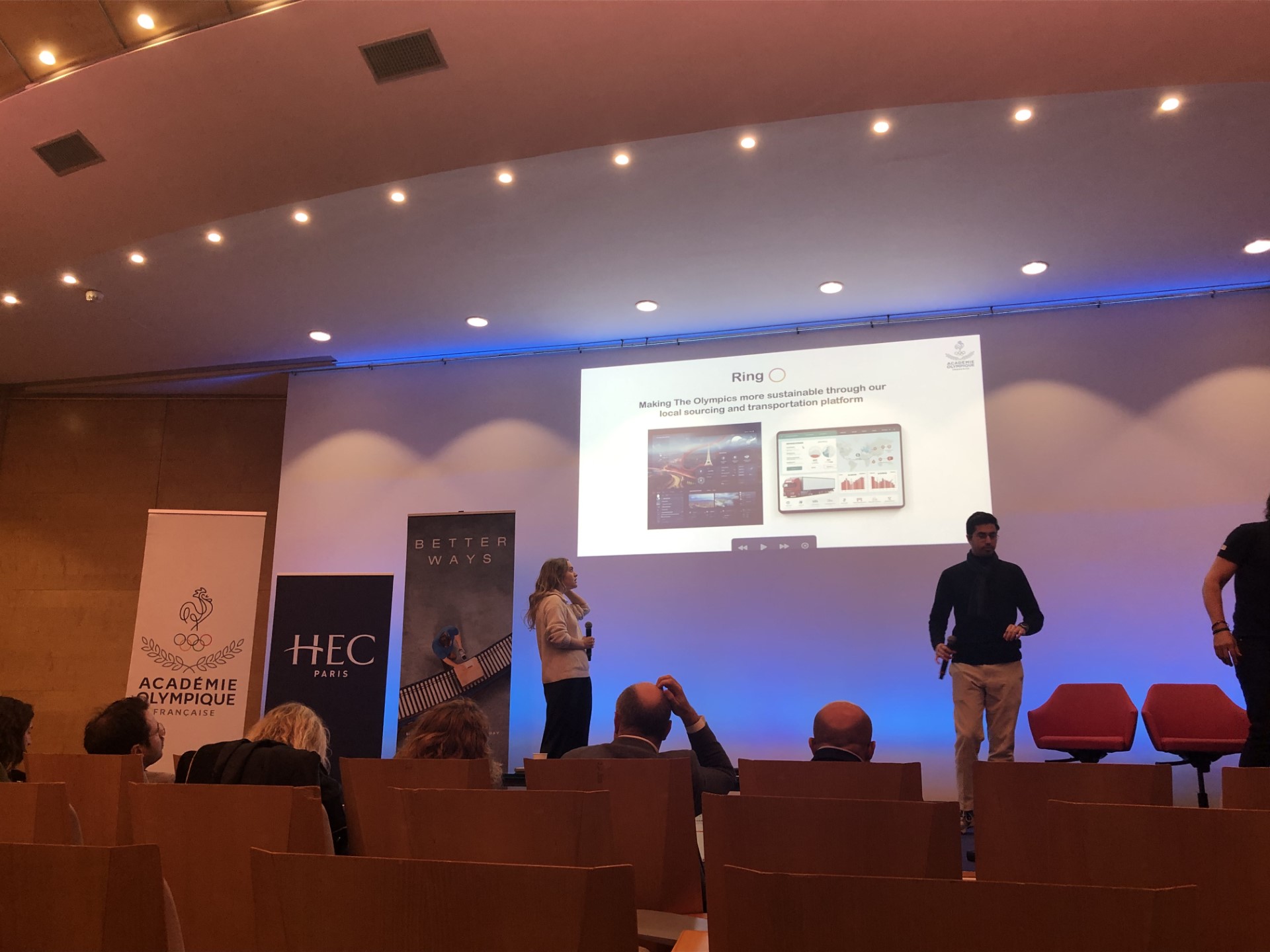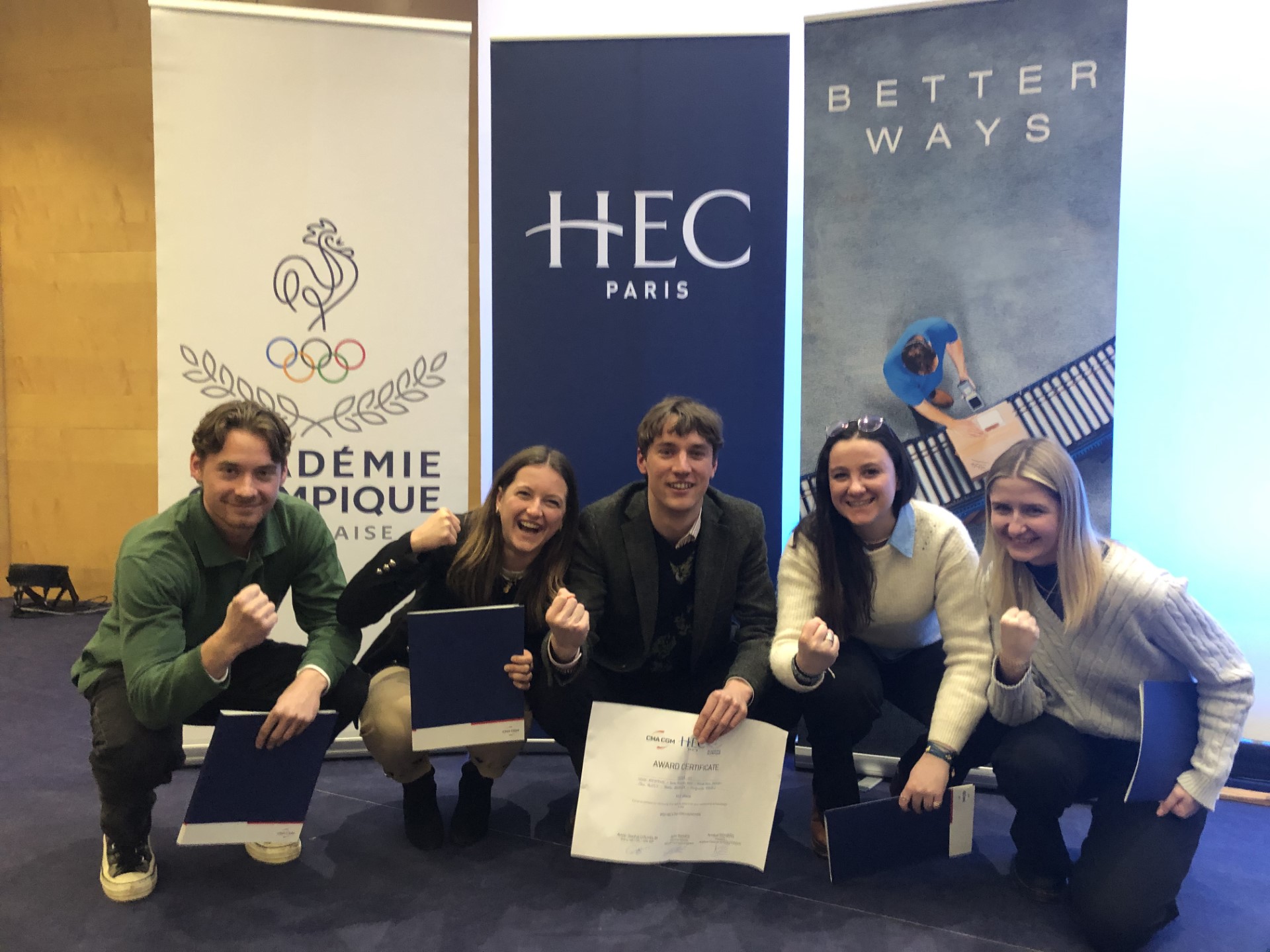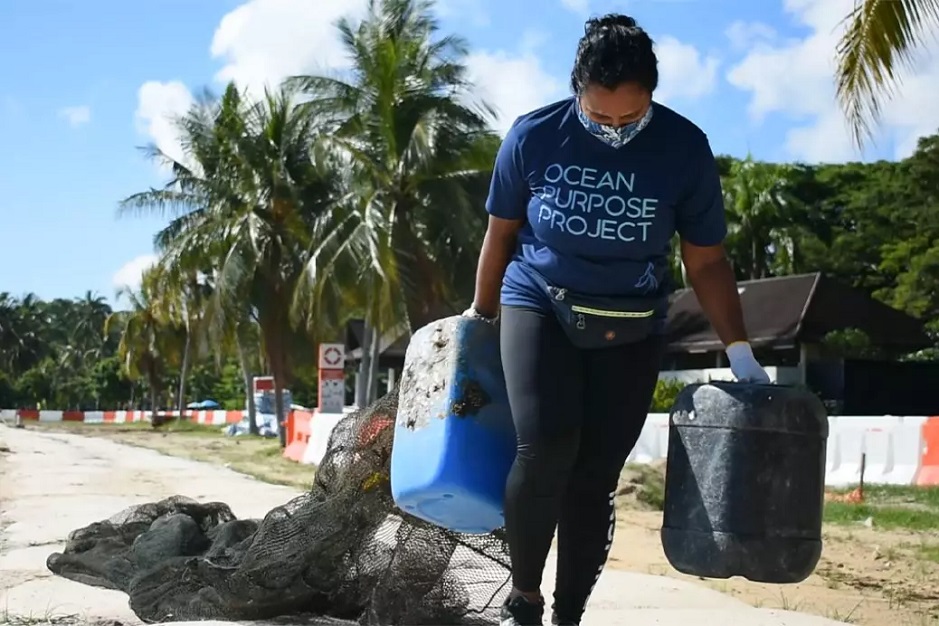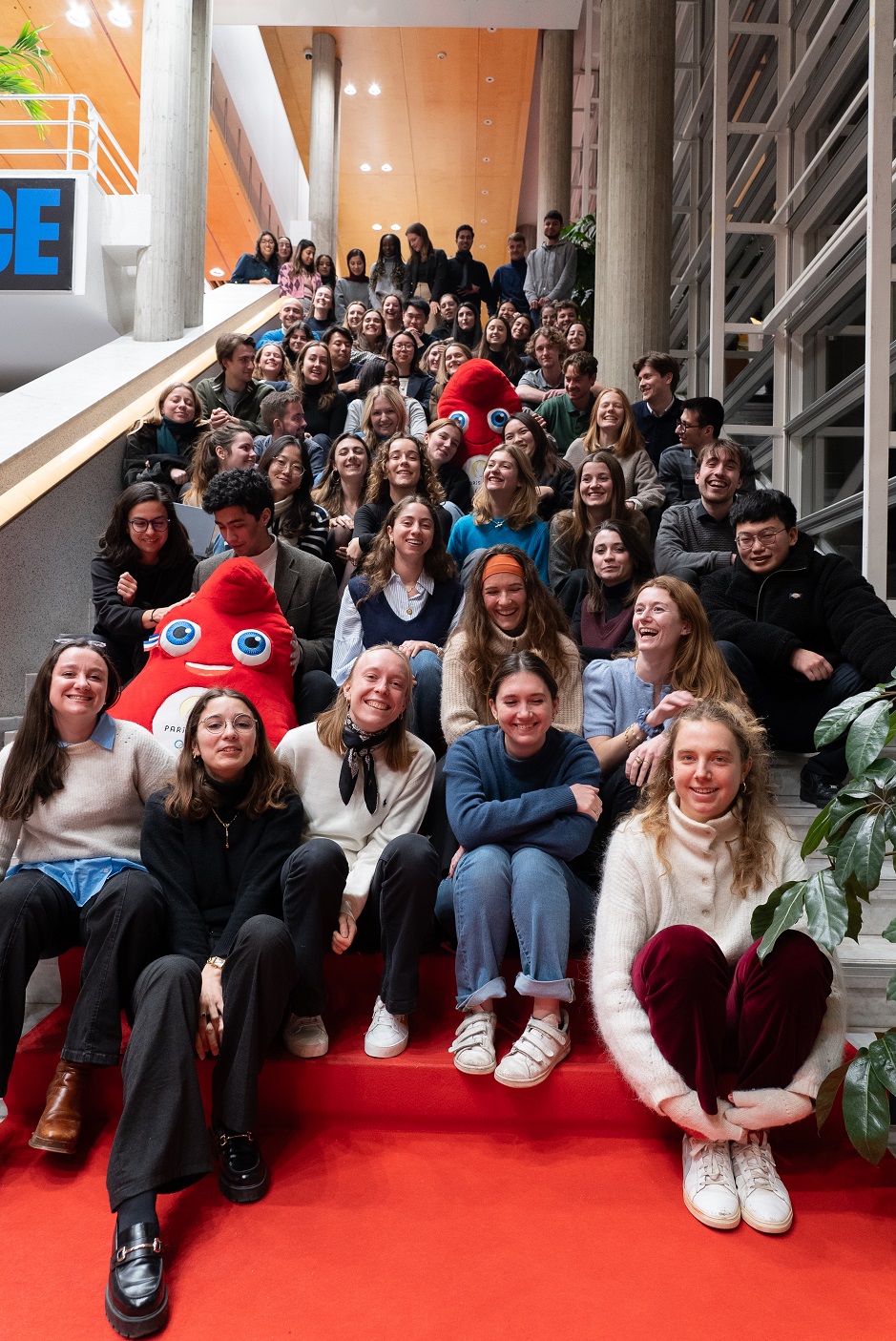How to make the Paris 2024 Olympic and Paralympic Games more sustainable?
How to make the Paris 2024 Olympic and Paralympic Games more sustainable?Students in the Sustainability and Social Innovation Master's program at HEC Paris were able to reflect - thanks to the expertise of the CMA CGM group, Official Partner in logistics solutions for Paris 2024, the Organizing Committee for the Olympic and Paralympic Games and with the support of the French National Olympic Academy - on solutions for optimizing the logistics and reuse of waste generated during the future Paris 2024 Olympic and Paralympic Games. A key day in the form of a hackathon for sustainable innovation was held on Friday January 19, 2024 at the French National Olympic and Sports Committee (CNOSF) in Paris, to reflect on global issues, the duty of eco-responsibility of major world events and work via a financial donation for an association dedicated to saving the oceans and the innovative reuse of plastic waste.
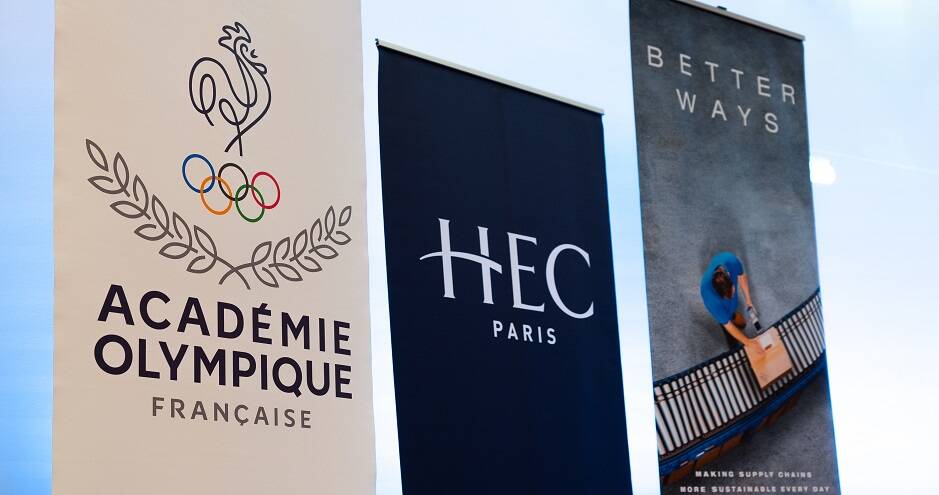
Auteur/Author of this article: Frédéric Voirin
"So many good ideas". These 4 words pronounced during the final jury by Wagner Covos, Executive Vice-President of CEVA Logistics - a subsidiary integrated into the CMA CGM group in 2019 - sum up this unique day dedicated to the optimization and reuse of waste potentially generated by the future Paris 2024 Olympic and Paralympic Games.
Thanks to this unique hackathon, almost a hundred students from the Sustainability and Social Innovation Master's program were able to reflect on global issues through concrete solutions for minimizing the ecological impact of the Paris 2024 Olympic and Paralympic Games, and to submit their eco-responsible ideas to professional and academic experts.
The event demonstrated the immense potential of sustainable logistics in the context of such a prestigious and eagerly-awaited global event as the Paris 2024 Olympic and Paralympic Games, and ultimately led to modest but concrete action to protect the oceans through a financial donation to an association fighting for the preservation of marine fauna and flora, and a highly original transformation of plastic.
An exclusive hackathon to think about sustainable development of Paris 2024 Olympic and Paralympic Games
As an Official Partner of Paris 2024, CMA CGM has collaborated in an unprecedented way with HEC Paris - with which a research chair in sustainable development and supply chain analysis has been in place since 2023 - and for the first time with the Paris 2024 Organizing Committee for the Olympic and Paralympic Games (COJOP) and the French National Olympic Academy - which promotes Olympic and Paralympic values in France via scientific research, culture, education and international cooperation since 1994 and has been a partner of HEC Paris since 2022 - to reflect on the logistical optimization and potential reuse of waste generated during Paris 2024.
This unprecedented hackathon took place on Friday January 19, 2023 at the French National Olympic and Sports Committee with the two classes of the Master Sustainability and Social Innovation.
A total of 87 students, divided into 15 groups, spent a day preparing their proposals for optimizing the logistics of the global event Paris 2024, which is expected to welcome almost 16 million people.
The first Paris 2024 x CMA CGM x HEC Paris hackathon dedicated to sustainable development as part of the Paris 2024 Olympic and Paralympic Games.
After being supervised all morning by a number of HEC Paris teaching coaches, including Vincent Bernard, an entrepreneur from the HEC incubator and graduate (H.06) of the HEC Paris-Mines ParisTech double degree in information systems management, Jérôme Flammier, Head of Sports Programs at HEC Paris and Pauline Laravoire, Executive Director of the SASI Master program, the students presented their 15 projects to an academic jury at the end of the afternoon.
The jury of experts in CSR, logistics and the analysis of eco-responsible projects included Anne-Sophie Cochelin, Deputy Director of Social and Environmental Responsibility for the CMA CGM Group, Wagner Covos, Executive Vice-President of CEVA Logistics, Caroline Louis, Circular Economy Manager for Paris 2024, Arnaud Richard, President of the National Olympic Academy and Professor of Language Sciences at Toulon University, Julie Thinès, Director of Grande Ecole Programs at HEC Paris and François Gemenne, Academie Director of the SASI Master Program, IPCC reporting manager and Professor of Economics and Decision Sciences at HEC Paris.
Concrete proposals to make Paris 2024 Olympic and Paralympic Games more sustainable and responsible
Complementing the already existing ESS2024 platform promoting the integration of social and solidarity economy companies within the Paris2024 Olympic Games, this hackathon aimed to brainstorm innovative solutions for the sustainable development of the world's most-watched sporting event.
The topic of this hackathon was "managing the logistics of the Paris 2024 Olympic and Paralympic Games. How can we make Games operations more sustainable?". This topic was a real call to action for the ingenious young minds gathered at the heart of the Paris 2024 Olympic and Paralympic Games organizing committee.
Over the course of an entire day, the small group of one hundred SASI Master's students were able to brainstorm concrete, innovative proposals that demonstrate the immense potential of sustainable logistics in the context of such a prestigious and eagerly-awaited global event.
Sustainable logistics have immense potential in the context of a global event as prestigious and eagerly awaited as the Paris 2024 Olympic and Paralympic Games.
As a result, innovative ideas have emerged in an attempt to transform logistics solutions by integrating sustainable innovation into the future of major sporting events.
Among the list of participants' most innovative proposals are projects - most of which are also applicable to the forthcoming Milan 2026 Olympic Winter Games - such as the recycling of aluminum and plastic from electronic cables, the replacement of air-conditioning units by an air-cooling system for sports facilities using tubular terracotta beehives, and a "ring" platform for optimizing truck-based logistics to maximize the employment of local hauliers, bunker filling and local journey times using algorithms based on live road traffic.
Recycling electronic cables and cargo containers, optimizing road transport, solar panels on storage warehouses, using artificial intelligence to benefit biodiversity: these are just some of the student projects.
Alongside the eco-responsible proposals for the Paris 2024 Olympic and Paralympic Games, other projects were also put forward by students around stock management in warehouses near stadiums, the use of solar panels on storage warehouses and the artificial intelligence-optimized relocation of these to areas that favor the preservation of biodiversity.
Finally, a so-called "wave of inclusion" proposal was put forward to recycle cargo storage containers into swimming pools, enabling elementary school pupils from deprived areas of Marseille to learn to swim. According to the students in this group, this would democratize access to swimming clubs and help prevent drowning among these children, half of whom currently do not know how to swim when they leave fifth grade (CM2).
A winning project to reuse furniture for the Paris 2024 Olympic and Paralympic Games
Of all the projects submitted, one in particular stood out in the eyes of the expert jury for its feasibility, its refined economic and financial analysis, and its originality in terms of sustainable innovation.
This was the "Team13" project, led by Leonie Hauffmann, Louis-Florentin Pape, Maud-Alice Hantat, Clemens Ziegeler, Olha Vasiliv and Marguerite Tetreau, to develop a locally-sourced, short-circuit furniture solution based on the combined reuse of its function and raw materials.
Louis-Florentin Pape testified to his group's collective satisfaction at the announcement of the result: "We're grateful to have had the opportunity to work on such an interesting subject, and to demonstrate SASI's excellence outside the HEC campus. We really had fun with this hackathon and it's certainly with a boosted ego that we'll be tackling the next semester."
"We proposed a locally sourced, short-circuit furniture solution and the combined reuse of its function and raw materials."
Every year, according to Eurostat, the waste generated by the construction sector in France amounts to 213 million tons. So this solution, once extrapolated from Paris 2024, could also help reduce the impact generated in part by the use of furniture, which is mostly destroyed and very rarely recycled.
A donation of 4,000 euros to preserve the oceans, transform plastic into fuel and create algae-based filters
The winners of this hackathon won a prize worth 4,000 euros, financed by CMA CGM. Team13 students then had the weekend to think about which charity they could donate it to.
In the end, the winners chose to donate the 4,000 euros to Ocean Purpose Project, an Indonesian social enterprise that works to preserve the oceans and has created a unit to transform plastic into hydrogen!
According to its founders, "beach clean-up operations collect plastic from the oceans and pass it on to the plastic-to-fuel unit, while engaging communities, educating the public to live responsibly and sustainably, in order to reduce the cause of this pollution."
"Ocean Purpose Project collects plastic from the oceans for fuel and transforms algae into toxin filters".
This is followed by pyrolysis, transforming the plastic into low-sulfur fuel, hydrogen and carbon nanotubes. It transforms 320 tonnes of unsorted ocean plastic into 316 tonnes of highly profitable products, with 100% capture of gas emissions. To date, the company has already collected over 7 tonnes of plastic and replanted 170 trees.
Another impact of ocean pollution is the proliferation of harmful algae, which deprives marine biodiversity of oxygen and leads to massive fish kills, reducing the ecosystem and resources of local populations. In parallel, Ocean Purpose is running a "bioremediation and bioplastic" project to develop the breeding of indigenous algae and mussels in Pasir Ris (Indonesia).
These organisms have the capacity to filter toxic water, enabling fish to remain healthy and be sold within the required sanitary standards. Algae and mussels grow naturally in abundance in the waters of Pasir Ris. Once they have grown, they can be transformed into bioplastics.
Once its prototypes have been financed, Ocean Purpose will be able to develop its projects throughout Southeast Asia. If you would like to contribute to the project, click here: https://www.oceanpurposeproject.com/
To round off the hackathon, CMA CGM employees, who had flown in from Marseille especially for the occasion, rubbed shoulders with the students "with great pleasure and enthusiasm".
CMA CGM's Deputy Director of Corporate Social Responsibility, Anne-Sophie Cochelin, and Lauriane Blandel, Head of University Relations and Partnerships, told the participants that they would be "delighted to have their brilliant and ingenious minds on their team" and enable them to complete their internships, as well as employment opportunities in commercial, strategic and operational functions, and VIEs.
Indeed, as Official Logistics Solutions Partner of Paris 2024, the CMA CGM Group provides a complete suite of logistics and commercial transport solutions, notably through its logistics subsidiary, CEVA Logistics, and its air transport subsidiary, CMA CGM Air Cargo. The project includes international transport, customs clearance, warehousing, local site delivery, site logistics, special freight and IT and systems integration.
“This hackathon was very insightful”
Discover the Sustainable and Social Innovation Master's Program of HEC Paris
Know more about HEC Paris sustainabilty's engagement
Read the interview of François Collin (H.87), Sustainability Director of HEC Paris
